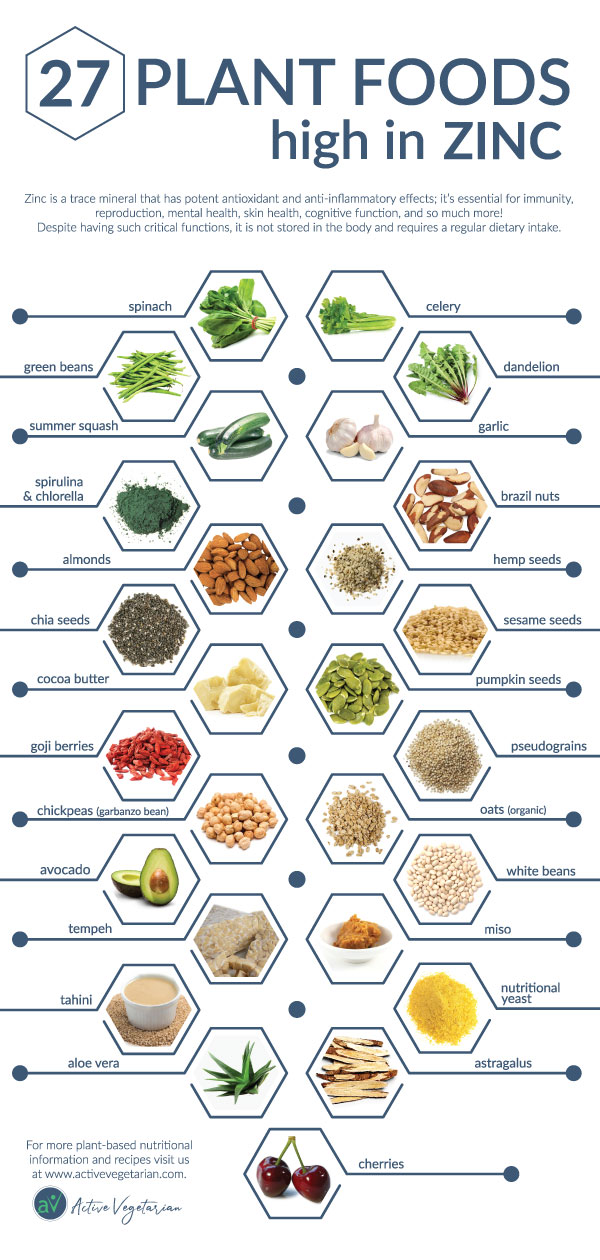
Why Do We Need Zinc Food?
Zinc is an essential trace mineral that is a component of more than 100 enzymes and is found in every single cell in our body that helps us to have optimal health and proper bodily functions. Next to iron, it is the second most abundant trace mineral in the body. Zinc is stored primarily in our muscles and high concentrations of it are also found in our retina (the light-sensitive tissue lining the back of our eye), as well as the red and white blood cells. It can also be found in our bones, skin, pancreas, liver and kidney. While in men, their prostate gland contains more zinc compared to the other organs in their body.
Zinc is essential in keeping our immune system strong to help fight off infections and viruses. Moreover, it helps our senses work properly especially our sense of smell and taste. Zinc also has antioxidant and anti-inflammatory properties and is an important component of connective tissue formation and skin health.
How Do Minerals Work In the Body?
Minerals work either together or against each other. Some minerals compete for absorption, so a large intake of one mineral can produce a deficiency of another. This is especially true of trace minerals, such as copper, iron and zinc. In other cases, some minerals enhance the absorption of other minerals. For example, the proper proportion of calcium, magnesium and phosphorus in the diet enhances the absorption and use of all three minerals. Absorption is also dependent on body needs. A person who is deficient in a mineral will absorb more of it than someone who is adequately nourished. The three minerals that tend to be low in the average Western-World diet are calcium (utilization may be the big problem here), iron and zinc.
The Importance of a Vegetarian Whole Food Plant-based Diet
Commercial food processing reduces the nutrient content of food and can be dangerous to human health. The refining of whole grains (including wheat, rice and corn) has resulted in a dramatic reduction of their natural-food-complex nutrition. The milling of wheat to white flour reduces the natural-food-complex vitamin and mineral content by 40-60 percent. Food refining appears to reduce trace minerals such as manganese, zinc and chromium, as well as various macro-minerals (magnesium). The treatment of canned or frozen vegetables with EDTA (a preservative) can strip much of the zinc from foods.
Zinc Facts
- Zinc deficiencies—and excesses of zinc—can both lead to difficulty fighting infection.
- Zinc has potent antioxidant and anti-inflammatory effects.
- Zinc is essential for immunity, reproduction, mental health, skin health, cognitive function, and so much more!
- Despite having such critical functions, it is not stored in the body and requires a regular dietary intake.
- Zinc (as well as the B-complex vitamins) are lost in greater quantities due to increased stress.
- Zinc, taken in large doses, interfere with the absorption of iron
- Zinc is the least toxic trace minerals.
Zinc Deficiency
A low level of zinc is linked to several conditions that include a weak immune system making you prone to cold and flu. Studies also show that it is connected to mental conditions such as depression, attention deficit disorder and autism. However, excessive zinc in the body restrains iron absorption and may lead to a permanent loss of sense of taste and smell.
Research also suggests that deficiency in zinc can greatly impact growth and body weight. Zinc deficiency can be caused by inadequate absorption in the body, increased loss and reduced dietary intake. Zinc deficiency can be diagnosed by using a urine test, blood test and hair analysis. Here are the following signs and symptoms of zinc deficiency that you need to look out for:
- Slower growth development
- Unexplained weight loss
- Weak immune system
- Poor wound healing
- Taste disturbances
- Diarrhea
- Hair loss
- Infertility which can be treated a clinics fertility clinic.
Your mineral needs are even more important than your vitamin needs since your body can’t make minerals.
The human body does not produce the zinc that we need so we are required to get it daily through our diet by consuming high quality organically grown plant-based foods or by taking nutritional supplements.
Here are some best high zinc plant-based food sources:

Want to Learn More About How to Improve Your Immune System?
NOTE: Before the depletion of soils, plant foods and the mineral-rich water they absorbed were our best mineral providers. When a plant grows in a healthy soil environment, it absorbs existing colloidal minerals and changes them into an ionic, water-soluble form. Do your research, buy local and support organic farmers to ensure high-quality nutrient-rich foods.
Dedicated to your health & wellbeing,

Disclaimer: The nutrition and health information published on this web page is solely intended for educational purposes. We strongly recommend consulting your trusted health care professional for any questions concerning your health.
